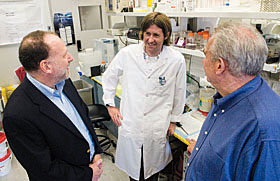  |
| HOME | THIS ISSUE | CALENDAR | GRANTS | BACK ISSUES | < BACK | NEXT > |
Grad student studies genes’ role in drug, alcohol dependence
by Carolyn Pennington - December 4, 2006
|
||||
| For graduate student Kevin Jensen, two labs are better than one. Jensen is the first student at the Health Center to formally hold a lab fellowship shared by two different departments: the Department of Molecular, Microbial, and Structural Biology and the Department of Psychiatry. Jensen's prior experience as a lab technician in the core laboratory of the General Clinical Research Center made him an ideal candidate for the position. At the G.C.R.C., Jensen performed genetic analyses of samples that were collected in a number of psychiatric studies. That's when Drs. Henry Kranzler, a professor, and Jonathan Covault, an associate professor in the psychiatry department, first became familiar with his work. "Kevin showed himself to be diligent and dependable, so when he applied to graduate school to work with Dr. Henry Furneaux in molecular biology, with whom I had been discussing the potential for collaborative work, it was an ideal opportunity to continue working with him," says Kranzler. A Niantic native and UConn graduate, Jensen spent his first year of the dual fellowship doing basic research on microRNA regulation and trying to determine how certain genes contribute to alcohol and drug dependence. MicroRNA typically regulates RNA levels. Research has found that it holds the key to important elements of cell biology and may be integral to many aspects of human health. By understanding and harnessing the power of microRNA, researchers are working to develop new treatments and diagnostic products for a wide range of diseases. At this point in his research, Jensen spends most of his time in Furneaux's lab trying to identify microRNA targets that would modify gene expressions.
"If you know what genetic flavor they are," says Jensen, "you can better determine what treatment, if any, works best for them." Jensen also has weekly lab meetings with the group led by Drs. Kranzler and Covault, and often meets informally to discuss his latest findings. Furneaux says Jensen is "the glue that holds the research together. This dual fellowship is allowing him to see the clinical side of things, the bigger picture if you will." Adds Jensen, "If I identify a variant that has a function they're interested in, they'll plug it into a population group and ask whether this variant is associated with a certain addictive behavior or psychiatric illness." Kranzler says that applying this "novel mechanism" of gene regulation to substance dependence may provide new insights into the causes of addiction. Jensen has already presented some of his findings at a scientific conference in Cold Spring Harbor, N.Y., where his research was well received. He's currently working on a paper that he hopes will be accepted by a major journal. "It's exciting," he says. "I'm gaining the experience of working in two different labs with two different mentors, and learning first-hand how my basic science research can be translated into treatments that may eventually improve human health." |
| ADVANCE HOME UCONN HOME |

